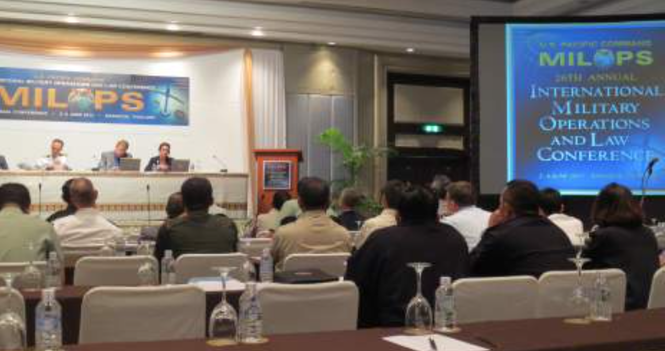
Military engagement in disaster response is on the rise. The on-going dialogue within the international community on improving coordination between humanitarian organisations and military actors has the potential to impact the character and success of relief operations going forward.
Civil-military coordination was among the topics covered at the 26th annual Military Law and Operations Strategic Engagement (MILOPS) in Bangkok in June. The conference was convened by the United States Pacific Command (USPACOM) and brought together military personnel from the Asia Pacific region as well as key actors from legal, policy and operational arenas.
The IFRC’s Disaster Law Programme (DLP) took part in a panel on ‘Strengthening Regional Mechanisms for Humanitarian Assistance and Disaster Relief (HADR) Management’ alongside representatives from UN OCHA’s Regional Office for Asia Pacific and the Centre for Excellence in Disaster Management and Humanitarian Assistance. The Chief of General Staff of the Nepalese Army participated as a guest panellist, providing a national perspective on strengthening emergency management and disaster response.
Representing the DLP, Asia Pacific Legal Officer, Ms Lucia Cipullo, delivered a presentation on the Guidelines for the Domestic Facilitation and Regulation of International Disaster Relief and Initial Recovery Assistance (IDRL Guidelines), and explained how the DLP has been engaging with governments, National Red Cross and Red Crescent Societies and other key regional partners to improve legal preparedness for international disaster assistance. While the IDRL Guidelines are not targeted at facilitating and regulating military assistance per se, the common problems addressed by the IDRL Guidelines can also arise in the receipt of military and civil defence assets (MCDAs). While usually covered by Status of Forces Agreements (SOFAs) or other bilateral agreements, barriers in relation to customs, immigration and other procedures are not uncommon in practice. Various guidelines have been developed to overcome these obstacles, including the Asia Pacific Regional Guidelines for the Use of Foreign Military Assets in Disaster Response Operations (MADRO), the content of which was discussed at a United Nations workshop in the region last December.
Ms Cipullo shared a Red Cross and Red Crescent Movement (RCRC) perspective on civil-military relations and the use of MCDAs in disaster relief. She highlighted the importance of distinguishing between RCRC relief goods and personnel and military actors. “Civilian and military actors are often operational at the same place and time, and we are seeing an increasing involvement of military actors in disaster response operations,” she said. “We maintain that it is important to distinguish between humanitarian and military resources and objectives, so that the RCRC is perceived as neutral and independent at all times.”
Lively discussions ensued in relation to the use of foreign military assistance in disasters, with some debate around the use of MCDAs as a ‘last resort.’ This point is emphasized by Resolution 7 of the 2005 RCRC Council of Delegates, providing that “the use of military assets by a component of the Movement ... should be a last resort: it can be justified only by the serious and urgent need for life saving humanitarian action and when there is no alternative means of taking that action.”
The HADR discussions at this year’s MILOPS reiterated the need for the RCRC to remain engaged in dialogue around civil-military coordination, in order to disseminate information about the RCRC role and the principles by which it operates. Highlighting the important distinction between RCRC and military relief goods and personnel is crucial to safeguard privileged access for the delivery of humanitarian assistance to people in need. The MILOPS provided a relevant forum for these discussions and resulted in meaningful exchanges regarding the role of the military in international disaster relief operations.